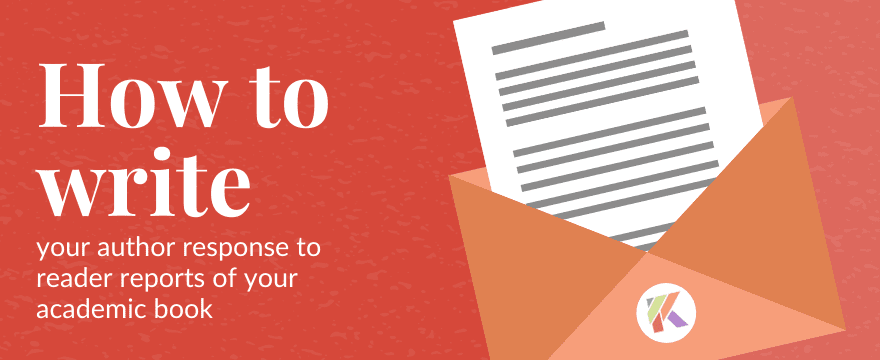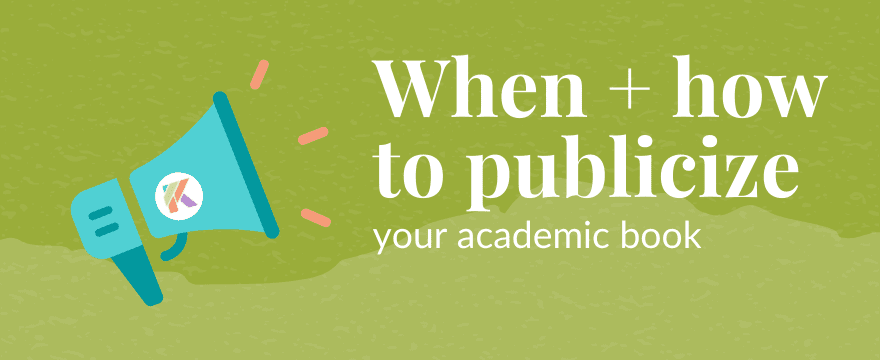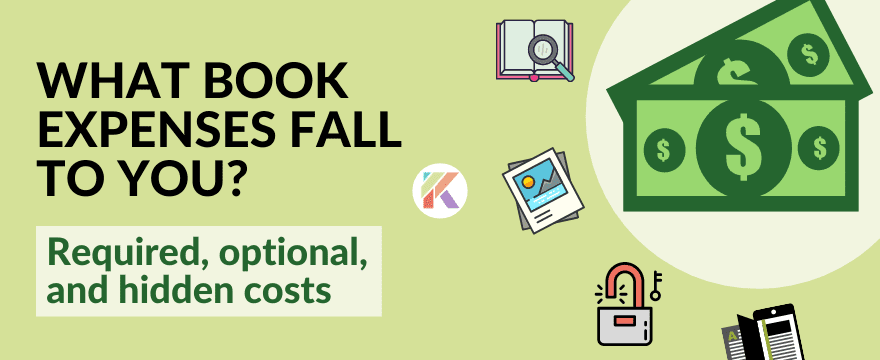When I was writing my own first monograph, most of the steps were fairly evident. I knew I’d need to find a publisher, submit proposals, and prepare the manuscript.
One step, though, caught me totally off guard: I somehow didn’t know that I’d need to write a formal author response letter upon receiving my book’s peer review reports. The kicker? You usually have a week, give or take, to write it.
Whether you’re frantically searching for information about how to write this letter (that you just found out you have to write!), you’re just starting out and want to know what to expect, or you’ve just submitted your manuscript and are thinking ahead to peer review (congrats!), this post covers all the bases about writing your response to peer reviews.
Table of Contents
The Basics of an Author Peer Review Response Letter
At what points in the publishing process will I need to write an author response letter?
Your editor will likely ask you to respond in writing any time your materials are peer reviewed. So, if your press sends both the proposal and the manuscript for peer review, you should expect to write two author response letters. Your response to the proposal review will likely be shorter than the response to the full manuscript review.
How long will I have to write my author response letter to peer reviews?
While your manuscript will be out for review for 3–6 months, you will likely only have a week (or a few days in rare circumstances) to prepare your author response letter to peer reviews, especially if the final review comes in close to an editorial board meeting. So, you should begin processing the reviews as they come in (the editor will likely send you the first one as they receive it instead of waiting for both) and, at the minimum, begin structuring or outlining some points you will make in your response letter.
What is the purpose of my author response letter?
Broadly speaking, your author response letter serves two main purposes.
Addressing the Reviewers’ Concerns (Discussing How You Will Improve the Book)
First, and most obviously, your author response letter outlines how you will revise the manuscript in order to address the reviewers’ comments. To fulfill this purpose, your author response letter must show you have taken the reviews seriously and have developed a reasonable plan to address the reviewers’ main concerns.
Making a Strong Case for the Book (Highlighting Your Book’s Strengths)
Second, your letter will also become part of the package used to present your book to the press’s editorial board. So, a less-than-evident purpose of your author response letter is to help you (and your editor) make a strong case that the press should continue to pursue the project. Put differently, your response letter is, in fact, the best way you can help your editor present your project to the board.
Preparing to Write the Letter: What to Do When Reports Come in
Get Outside Perspectives
First, review the tips from an author about what it’s like to receive peer reviews, and how to set yourself up for success at this critical milestone. Specifically, when you submit the manuscript to your press (or get close to receiving your reviews), assemble a support team who can help you parse the reports and review your letter.
Start Parsing Your Reviews When You Receive The First Report
Second, know that your editor will likely pass on the review reports as they come in, so you might receive one report up to a month before the other. Because you will have limited time to prepare your response letter (about a week), you should begin parsing the reports and planning your response as the report(s) come in, even if you don’t actually begin writing the formal letter until you have received both.
Do seek outside perspective(s) on the reports. Since it is such an emotionally-charged milestone, many authors who have received overwhelmingly positive reviews have felt completely deflated by the few critiques peer reviewers offer (and, sometimes, the sheer length of a review).
Genuinely Seek to Understand the Comments
As you consider the reviewers’ reports, you might feel the urge to dismiss certain comments outright. For instance, you might think: “They said I didn’t clearly make a case for how my reading of [text A] differs from [other scholar’s], but I said that on page 134! They clearly didn’t read the manuscript carefully!”
Even if your thoughts begin along these lines, resist the urge to dismiss comments outright. Instead, find the bigger issue behind what the reviewer said. In this case, ask: how can you better foreground (perhaps earlier or more clearly) how your claims differ from what other scholars have said? In your letter, do not disparage the reviewers or suggest that they were negligent. Engage only with the content of their reports.
Categorize and Synthesize The Comments
Finally, as you’re processing the comments, categorize them by type so that you can synthesize them in your response letter. For instance, perhaps the reports contain sixteen individual comments that revolve around how you present secondary scholarship. I would recommend classifying them together, since your letter will likely describe how you will fix this issue, broadly speaking.
Writing the Author Response Letter to Peer Review Reports: FAQ
Do I need to do everything the reviewers suggest?
Few authors really internalize this point before the author response letter stage: you are in charge of your project, and you get to decide how to balance the reviewers’ comments with your vision for the book. (Though the press, of course, can decide it does not want to publish the project you’ve envisioned). So, you definitely do not need to agree to do everything the reviewers suggest, but you do need to show that you’re taking the reviews seriously.
If you choose not to do something a reviewer suggests (or do something different than what they suggest), you will need good reasons. For instance, a reviewer might recommend that you cut a chapter. This major recommendation will seriously impact the book’s claims and narrative arc. First, seriously consider the reviewer’s comment: do they make valid points? Should the chapter be cut? Does it detract from the book-level claims?
If you ultimately disagree that cutting the chapter is in your book’s best interest, your letter will need to describe how you will revise the project (or chapter) to address the reviewer’s underlying concerns. For instance, if the reviewer cites too much overlap between Chapters 3 and 4 as the cause for their suggestion, your case for keeping Chapter 4 should describe how you will revise it to better differentiate it from Chapter 3. You should likely also outline what this chapter adds to the book-level claims (that the reader could not get were you to cut Chapter 4).
Do I need to address every comment?
You do not have to respond to each of the reviewers’ suggestions individually, but you need to ensure that all of their comments are addressed by some part of your letter. As I recommended above, you will likely be able to group several of the comments together (like those centering around style and voice).
How should I structure my response letter?
There is no one right way to structure your author response letter. Typically, though, your first paragraph should thank the reviewers for their careful comments and underscore the merits they saw in your project. If there are particularly supportive comments in the reviewers’ reports, you can feel free to quote them directly. Use this paragraph to make a strong case for your project’s strengths.
The letter’s core can be presented as discrete sections (mirroring the reviewers’ reports, if applicable), as paragraphs, or as a bulleted list (in whole or in part). When possible, you should try to synthesize the reviewers’ comments. For instance, instead of treating multiple comments related to your individual close readings separately, group them into one point (or paragraph).
Your final paragraph should reiterate your appreciation for the reviewers, restate your interest in working with the press, and outline additional details regarding when you expect to be able to submit the revised manuscript. If you are on a tight timeline, do coordinate with your editor regarding a timeline for final manuscript submission in advance of submitting the author response letter. Also consider querying trusted mentors regarding how many months you should expect revisions to take, given the reviewer comments.
Want more concrete ideas? Check out Chapter 13 of Laura Portwood-Stacer’s The Book Proposal Book or this targeted blog article.
Any recommendations on tone, especially when disagreeing with reviewers?
As outlined above, be positive and professional. Do not disparage the reviewers or dismiss their comments. Instead, show that you have taken their suggestions seriously. Present the most compelling case possible if you disagree with their assessment. Be as specific as you can.
Examples to Avoid:
- The reviewer said I didn’t do a good job of articulating how my claims are different from [scholar’s], but they clearly read the book too quickly because I do exactly that on p. 134.
- The reviewer recommended I cut Chapter 4, but I’m going to keep it. Or: I don’t think cutting Chapter 4 is a good idea because it’s an important chapter. (Doesn’t make a convincing case for why Chapter 4 is important or address the reviewer’s underlying concerns that cause them to make this recommendation to begin with.)
- The reviewer recommended that I develop the theme of [theme], but that’s not something I am interested in doing.
Stronger Examples:
- Reviewer 2 recommended that I cut [specific case study] because the conclusions I offer don’t clearly differentiate themselves from [other scholar’s]. I agree with Reviewer 2 that, in its present form, the section does not make this distinction as clearly as it could. In the revised manuscript, I will more clearly present how my section builds on, but ultimately departs from, [what scholar said]. Specifically, [describe how your conclusions are different from what the other scholar claimed].
- Reviewer 2 recommended that I cut Chapter 4 because [reviewer’s reasoning]. While I agree with reviewer that [piece you agree with], I instead believe I can better address this concern by [specific plans; for instance: restructuring the chapter’s introduction, removing the section on (work), and adding a discussion of (case)]. [Multiple sentences describing how, specifically these alternative changes would address the reviewer’s concerns.]
- Reviewer 2 recommended that I develop the theme of [theme]. While I will certainly better foreground [this theme] at moments when it’s relevant to project–for instance, in [specific chapter], I will [what you will do] and in [specific chapter], I will [what you will do]–developing the theme to the extent they suggest will detract from the book’s overarching claims [in this specific way].
You’ve Submitted Your Letter! Now What?
First, the editor will review your author response letter to make sure it conforms to what they expect to find. If there are significant problems, they might send it back to you for revisions. When the letter is acceptable, the editor will prepare your book’s materials to present before the editorial board meeting. They will likely tell you when they plan to present your book to the board and when you can expect to hear about the board’s decision regarding an advance contract (if responding to review of a proposal) or a full book contract (if responding to review of a full manuscript).
Once I submit my letter, should I start working on the revisions?
If you’re so inclined, you can certainly work on some the revisions you’d likely need to make regardless of the press’s decision. These might include pushing your close readings further, removing explicit lit review sections, or making stylistic changes the reviewers recommended.
I would caution against making major changes to the manuscript before you’ve heard back regarding whether the press has awarded your book a contract. The editor, reviewer(s), or editorial board might not be convinced that your proposed changes will truly address the issues. You do not want to find yourself mid-major overhaul only to discover that you need to make different changes.
The editorial board meeting date has passed and I haven’t heard back from my editor: What should I do?
First, breathe. While the lack of news might mean bad news, it’s actually not uncommon for editors, in the flurry of activity surrounding a board meeting, to think they have sent an email (or a contract) to an author, only to discover a few weeks later that the email is still a draft in their mailbox.
Give your editor a few weeks, then feel free to check in with them.



